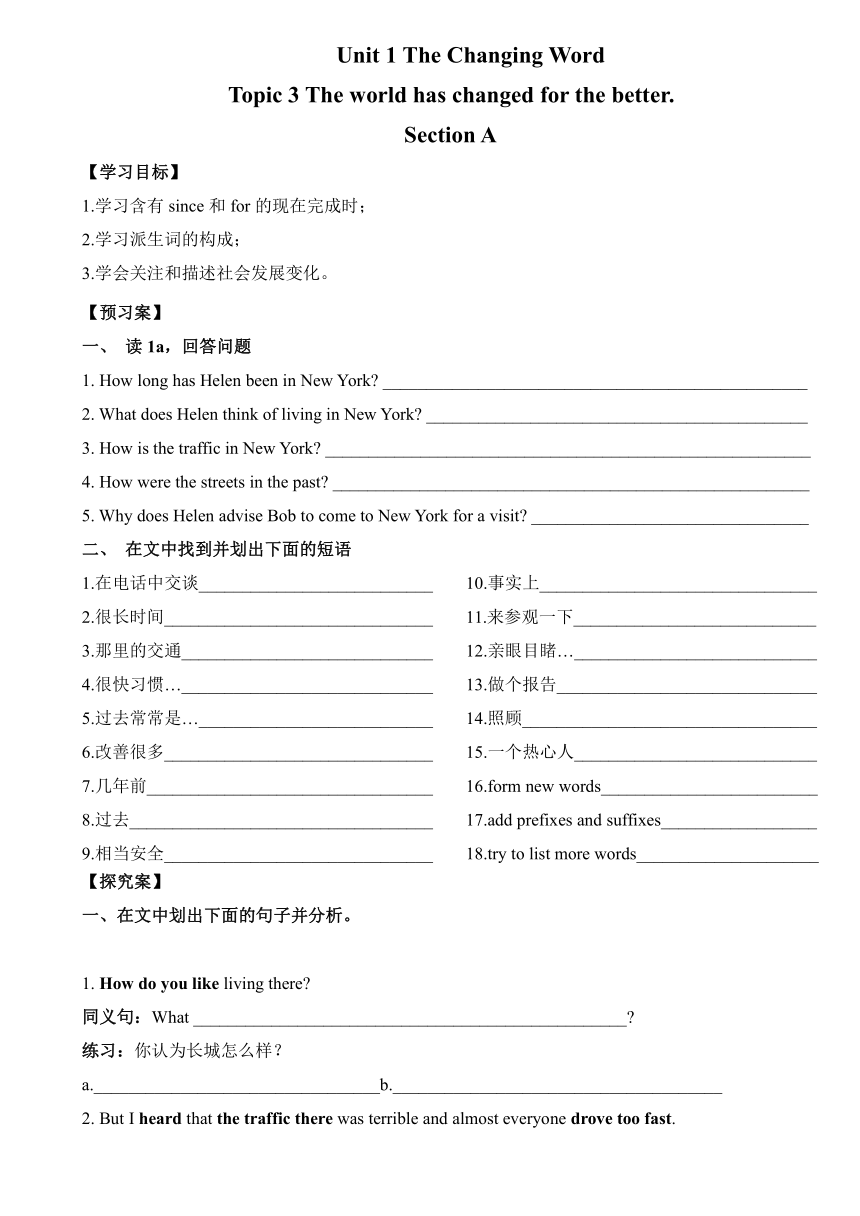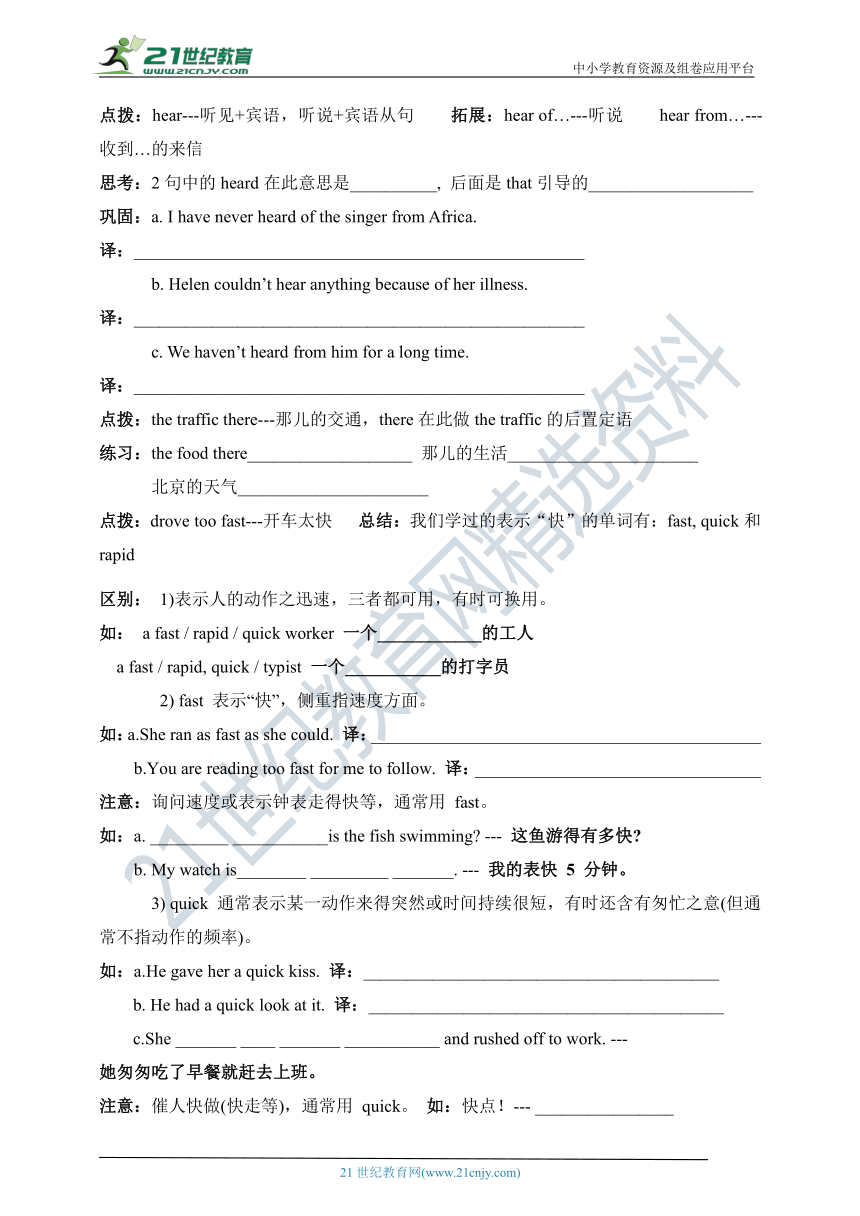Unit1 The Changing World Topic 3 The world has changed for the better SectionA-导学案
文档属性
| 名称 | Unit1 The Changing World Topic 3 The world has changed for the better SectionA-导学案 |

|
|
| 格式 | zip | ||
| 文件大小 | 1.2MB | ||
| 资源类型 | 教案 | ||
| 版本资源 | 仁爱科普版 | ||
| 科目 | 英语 | ||
| 更新时间 | 2018-09-19 00:00:00 | ||
图片预览


文档简介
Unit 1 The Changing Word
Topic 3 The world has changed for the better.
Section A
【学习目标】
1.学习含有since和for的现在完成时;
2.学习派生词的构成;
3.学会关注和描述社会发展变化。
【预习案】
一、 读1a,回答问题
1. How long has Helen been in New York? _________________________________________________
2. What does Helen think of living in New York? ____________________________________________
3. How is the traffic in New York? ________________________________________________________
4. How were the streets in the past? _______________________________________________________
5. Why does Helen advise Bob to come to New York for a visit? ________________________________
二、 在文中找到并划出下面的短语
1.在电话中交谈___________________________
2.很长时间_______________________________
3.那里的交通_____________________________
4.很快习惯…_____________________________
5.过去常常是…___________________________
6.改善很多_______________________________
7.几年前_________________________________
8.过去___________________________________
9.相当安全_______________________________
10.事实上________________________________
11.来参观一下____________________________
12.亲眼目睹…____________________________
13.做个报告______________________________
14.照顾__________________________________
15.一个热心人____________________________
16.form new words_________________________
17.add prefixes and suffixes__________________
18.try to list more words_____________________
【探究案】
在文中划出下面的句子并分析。
1. How do you like living there?
同义句:What __________________________________________________?
练习:你认为长城怎么样?
a._________________________________b.______________________________________
2. But I heard that the traffic there was terrible and almost everyone drove too fast.
点拨:hear---听见+宾语,听说+宾语从句 拓展:hear of…---听说 hear from…---收到…的来信
思考:2句中的heard在此意思是__________, 后面是that引导的___________________
巩固:a. I have never heard of the singer from Africa.
译:____________________________________________________
b. Helen couldn’t hear anything because of her illness.
译:____________________________________________________
c. We haven’t heard from him for a long time.
译:____________________________________________________
点拨:the traffic there---那儿的交通,there在此做the traffic的后置定语
练习:the food there___________________ 那儿的生活______________________
北京的天气______________________
点拨:drove too fast---开车太快 总结:我们学过的表示“快”的单词有:fast, quick和rapid
区别: 1)表示人的动作之迅速,三者都可用,有时可换用。
如: a fast / rapid / quick worker 一个____________的工人
a fast / rapid, quick / typist 一个___________的打字员
2) fast 表示“快”,侧重指速度方面。
如:a.She ran as fast as she could. 译:_____________________________________________
b.You are reading too fast for me to follow. 译:_________________________________
注意:询问速度或表示钟表走得快等,通常用 fast。
如:a. _________ ___________is the fish swimming? --- 这鱼游得有多快?
b. My watch is________ _________ _______. --- 我的表快 5 分钟。
3) quick 通常表示某一动作来得突然或时间持续很短,有时还含有匆忙之意(但通常不指动作的频率)。
如:a.He gave her a quick kiss. 译:_________________________________________
b. He had a quick look at it. 译:_________________________________________
c.She _______ ____ _______ ___________ and rushed off to work. ---
她匆匆吃了早餐就赶去上班。
注意:催人快做(快走等),通常用 quick。 如:快点!--- ________________
4) rapid 比另外两词要稍正式些,通常指突然或急速(且连续不断)的动作。
如:a. He asked questions in rapid succession(连续).--- 他连珠炮似地发问。
另外: rapid 还有一个特殊用法,即指一种有益的高速度(相比之下,fast 和 quick 有时指无益的急速)。
如:He has made rapid progress in English recently.
译:__________________________________________________________
3. You will get used to it very soon if you come.
译:_________________________________________点拨:get(be) used to---习惯于,to在这里是介词
区别:used to---过去常常…, to在这里是不定式符号
练习:a.我们将很快习惯北京的生活。We ________ soon ________ _______ ______ the life ______ _________.
b.他已经习惯步行上班了。He _______ already ________ ________ _______ _________ to work.
c.他过去常常开车上班。He ________ ________ __________ by car.
4. They used to be, but the city has improved a lot since I came here a few years ago.
译:_____________________________________________________________________
思考:since在句子中做_______词,后面只能使用________________时态
二、填写1c的空格,分析现在完成时中since和for用法的不同
for + _____________的时间;since + _______________的时间
三、仔细阅读P121-122英语构词法,写出P18(3)中单词的意思
【归纳】
I. 从方框内选出可以替代句中画线部分的答案
A. What do you think of B. pay a visit C. many years D. happened E. go back
1. Our city has a wonderful program to help homeless people return to work.
2. They have been in the school for a long time.
3. How do you like living in the country?
4. You must come and have a visit.
5. This took place on the morning of October 12.
II. 选用所给单词并用其正确形式填空
get, do, wake, read, answer, wait, sleep, so, quick, angry
One day, we had an English class. The teacher noticed a boy (1)_________a picture book and said, “Tom, what do you usually (2)___________ after lunch?” Tom nervously (3)_________ up from his sea, but he did not know how (4)___________ it. He thought for some time and then said, “(5)___________ for supper.”
The teacher was displeased and just at that moment, he saw another boy (6)__________. The teacher was getting a little (7)___________now, but he was trying not to show it. Then he asked, “And you, Jake?”
As Jake was asleep, of course, he could not hear what the teacher had said. His desk-mate (8)__________ him up. Jake stood up (9)_________ and replied in loud voice, “(10)_________ do I.”
III. 根据要求变化下列各句
1. She asked me, “Why did you do that?” (改为间接引语)
She asked me _________ I _________ that.
2. He asked me, “How many times have you been to the Great Wall”. (改为直接引语)
He asked me how many times ___________ __________ been to the Great Wall.
3. The teacher taught us how we should do it. (改为简单句)
The teacher taught us how __________ it.
4. It’s raised a lot of money from people. (改为反意疑问句)
It’s raised a lot of money from people, ___________?
5. Mr. Smith asked Jack if he would go out with him that night. (改为间接引语)
Mr. Smith asked, “Jack, __________ you go out with me ___________?”
IV. 用for和since填空。
1. He has been here _____________ two hours.
2. The old man has lived in the town ____________ 1993.
3. My father has been away ____________ two days.
4. Kate hasn’t heard from him ____________ he left China.
5. I have known him ____________ he came to the city.
Topic 3 The world has changed for the better.
Section A
【学习目标】
1.学习含有since和for的现在完成时;
2.学习派生词的构成;
3.学会关注和描述社会发展变化。
【预习案】
一、 读1a,回答问题
1. How long has Helen been in New York? _________________________________________________
2. What does Helen think of living in New York? ____________________________________________
3. How is the traffic in New York? ________________________________________________________
4. How were the streets in the past? _______________________________________________________
5. Why does Helen advise Bob to come to New York for a visit? ________________________________
二、 在文中找到并划出下面的短语
1.在电话中交谈___________________________
2.很长时间_______________________________
3.那里的交通_____________________________
4.很快习惯…_____________________________
5.过去常常是…___________________________
6.改善很多_______________________________
7.几年前_________________________________
8.过去___________________________________
9.相当安全_______________________________
10.事实上________________________________
11.来参观一下____________________________
12.亲眼目睹…____________________________
13.做个报告______________________________
14.照顾__________________________________
15.一个热心人____________________________
16.form new words_________________________
17.add prefixes and suffixes__________________
18.try to list more words_____________________
【探究案】
在文中划出下面的句子并分析。
1. How do you like living there?
同义句:What __________________________________________________?
练习:你认为长城怎么样?
a._________________________________b.______________________________________
2. But I heard that the traffic there was terrible and almost everyone drove too fast.
点拨:hear---听见+宾语,听说+宾语从句 拓展:hear of…---听说 hear from…---收到…的来信
思考:2句中的heard在此意思是__________, 后面是that引导的___________________
巩固:a. I have never heard of the singer from Africa.
译:____________________________________________________
b. Helen couldn’t hear anything because of her illness.
译:____________________________________________________
c. We haven’t heard from him for a long time.
译:____________________________________________________
点拨:the traffic there---那儿的交通,there在此做the traffic的后置定语
练习:the food there___________________ 那儿的生活______________________
北京的天气______________________
点拨:drove too fast---开车太快 总结:我们学过的表示“快”的单词有:fast, quick和rapid
区别: 1)表示人的动作之迅速,三者都可用,有时可换用。
如: a fast / rapid / quick worker 一个____________的工人
a fast / rapid, quick / typist 一个___________的打字员
2) fast 表示“快”,侧重指速度方面。
如:a.She ran as fast as she could. 译:_____________________________________________
b.You are reading too fast for me to follow. 译:_________________________________
注意:询问速度或表示钟表走得快等,通常用 fast。
如:a. _________ ___________is the fish swimming? --- 这鱼游得有多快?
b. My watch is________ _________ _______. --- 我的表快 5 分钟。
3) quick 通常表示某一动作来得突然或时间持续很短,有时还含有匆忙之意(但通常不指动作的频率)。
如:a.He gave her a quick kiss. 译:_________________________________________
b. He had a quick look at it. 译:_________________________________________
c.She _______ ____ _______ ___________ and rushed off to work. ---
她匆匆吃了早餐就赶去上班。
注意:催人快做(快走等),通常用 quick。 如:快点!--- ________________
4) rapid 比另外两词要稍正式些,通常指突然或急速(且连续不断)的动作。
如:a. He asked questions in rapid succession(连续).--- 他连珠炮似地发问。
另外: rapid 还有一个特殊用法,即指一种有益的高速度(相比之下,fast 和 quick 有时指无益的急速)。
如:He has made rapid progress in English recently.
译:__________________________________________________________
3. You will get used to it very soon if you come.
译:_________________________________________点拨:get(be) used to---习惯于,to在这里是介词
区别:used to---过去常常…, to在这里是不定式符号
练习:a.我们将很快习惯北京的生活。We ________ soon ________ _______ ______ the life ______ _________.
b.他已经习惯步行上班了。He _______ already ________ ________ _______ _________ to work.
c.他过去常常开车上班。He ________ ________ __________ by car.
4. They used to be, but the city has improved a lot since I came here a few years ago.
译:_____________________________________________________________________
思考:since在句子中做_______词,后面只能使用________________时态
二、填写1c的空格,分析现在完成时中since和for用法的不同
for + _____________的时间;since + _______________的时间
三、仔细阅读P121-122英语构词法,写出P18(3)中单词的意思
【归纳】
I. 从方框内选出可以替代句中画线部分的答案
A. What do you think of B. pay a visit C. many years D. happened E. go back
1. Our city has a wonderful program to help homeless people return to work.
2. They have been in the school for a long time.
3. How do you like living in the country?
4. You must come and have a visit.
5. This took place on the morning of October 12.
II. 选用所给单词并用其正确形式填空
get, do, wake, read, answer, wait, sleep, so, quick, angry
One day, we had an English class. The teacher noticed a boy (1)_________a picture book and said, “Tom, what do you usually (2)___________ after lunch?” Tom nervously (3)_________ up from his sea, but he did not know how (4)___________ it. He thought for some time and then said, “(5)___________ for supper.”
The teacher was displeased and just at that moment, he saw another boy (6)__________. The teacher was getting a little (7)___________now, but he was trying not to show it. Then he asked, “And you, Jake?”
As Jake was asleep, of course, he could not hear what the teacher had said. His desk-mate (8)__________ him up. Jake stood up (9)_________ and replied in loud voice, “(10)_________ do I.”
III. 根据要求变化下列各句
1. She asked me, “Why did you do that?” (改为间接引语)
She asked me _________ I _________ that.
2. He asked me, “How many times have you been to the Great Wall”. (改为直接引语)
He asked me how many times ___________ __________ been to the Great Wall.
3. The teacher taught us how we should do it. (改为简单句)
The teacher taught us how __________ it.
4. It’s raised a lot of money from people. (改为反意疑问句)
It’s raised a lot of money from people, ___________?
5. Mr. Smith asked Jack if he would go out with him that night. (改为间接引语)
Mr. Smith asked, “Jack, __________ you go out with me ___________?”
IV. 用for和since填空。
1. He has been here _____________ two hours.
2. The old man has lived in the town ____________ 1993.
3. My father has been away ____________ two days.
4. Kate hasn’t heard from him ____________ he left China.
5. I have known him ____________ he came to the city.
同课章节目录
- Unit 1 The Changing World
- Topic 1 Our country has developed rapidly.
- Topic 2 The population in developing countries is
- Topic 3 The world has changed for the better.
- Unit 2 Saving the earth.
- Topic 1 Pollution has causes too many problems.
- Topic 2 All these problems are very serious.
- Topic 3 What can we do to protect the environment
- Unit 3 English around the World
- Topic 1 English is widely spoken around the world.
- Topic 2 Some things usually have different meaning
- Topic 3 Could you give us some advice on how to l
- Unit 4 Amazing Science
- Topic 1 When was it invented?
- Topic 2 I'm excited about the things that will be
- Topic 3 China is the third nation that sent a pers
